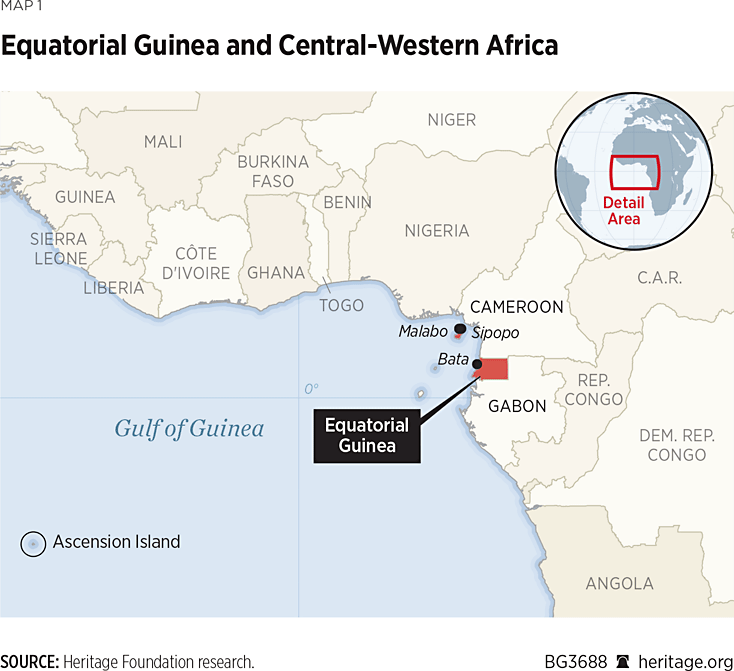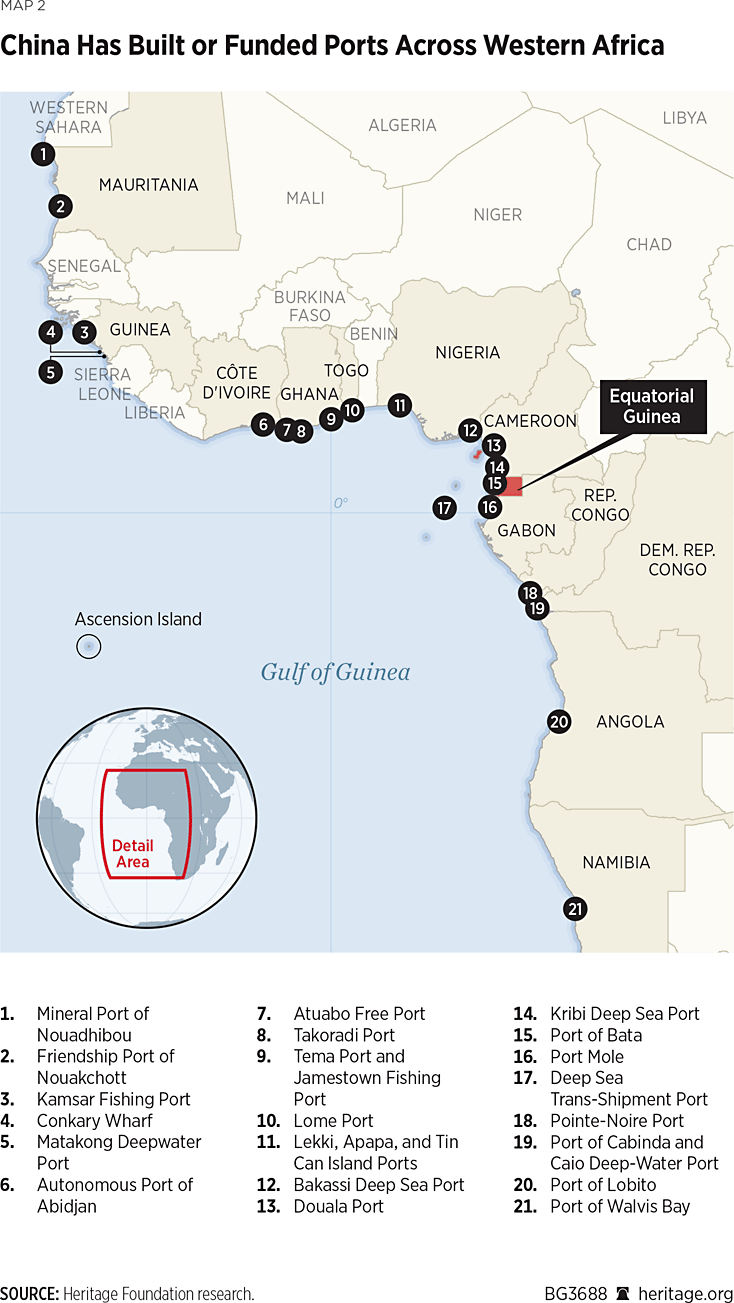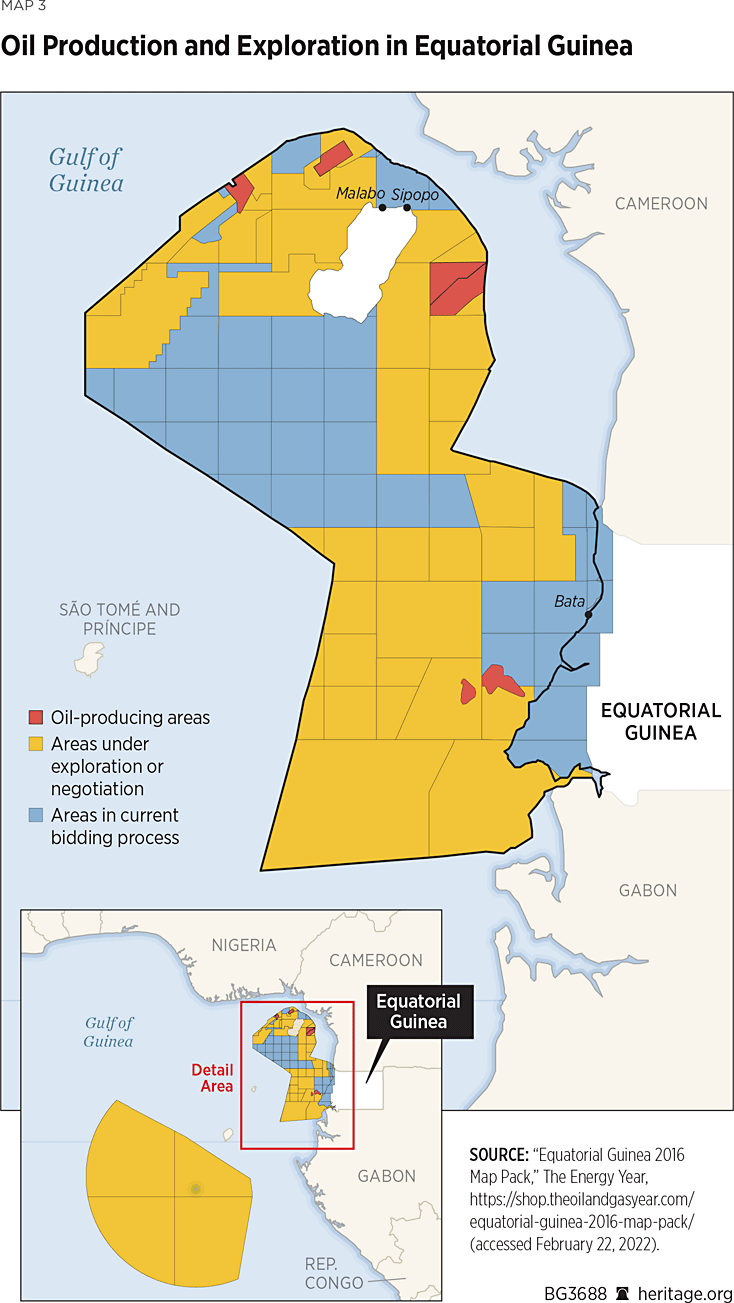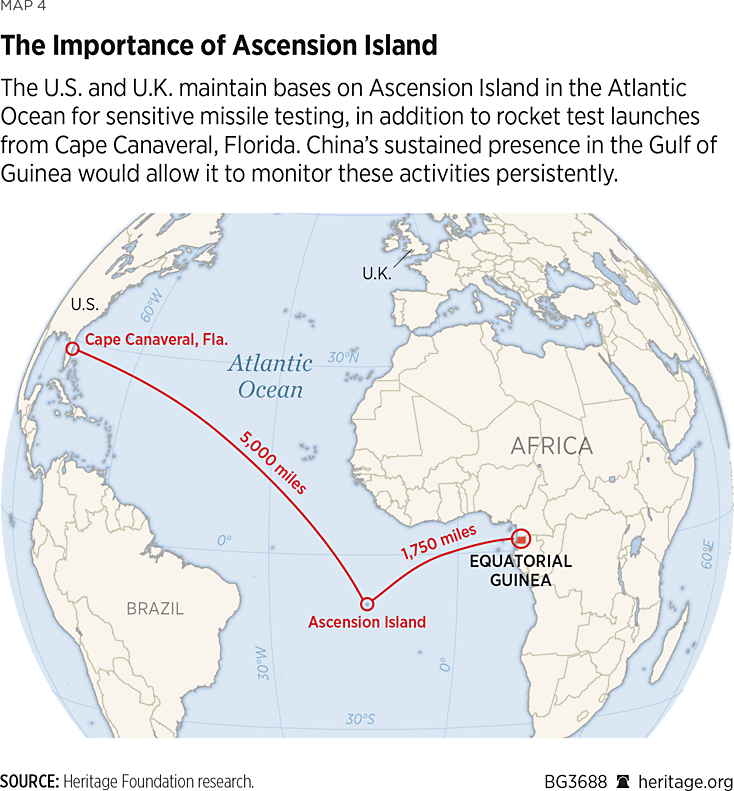In October 2021, a U.S. National Security Council (NSC) staffer traveled to Equatorial Guinea amidst troubling reports that China was being offered a naval base there. The story broke in December as U.S. efforts to prevent China’s acquisition of the base were failing. Little is publicly known of what has been offered to China, but if such a proposal came to fruition, it would allow the Chinese Communist Party (CCP) to conduct sustained naval operations closer to the U.S. than ever before.
China’s approach, a fusion of civilian and military resources, has been largely successful, but does have weaknesses. Global initiatives like the Maritime Silk RoadREF have earned the CCP economic toeholds across the world, easing military access at the same time. However, this approach relies on opaque deal-making with a select few pliable power brokers in target countries and largely benefits Chinese state-owned enterprises. The CCP’s nefarious approach provides the U.S. an opportunity to propose a better value proposition.
While it may be difficult to preclude CCP inroads in the case of Equatorial Guinea, the U.S. can slow or stymie China’s growing threat regionally and globally. The U.S. must do this without presenting a false choice to partner nations, in effect, Chinese economic development or security partnership with the U.S. A new way forward should allow for non-threatening Chinese overseas activities while assuring U.S. foreign market access and security interests. In the case of coastal African nations, this requires a new strategic framework that blends economic development with diplomacy and naval presence—naval statecraft.
Providing an alternative to the Chinese model will be challenging. A first step is offering the nations (e.g., Cameroon, Equatorial Guinea, and Nigeria, etc.) of the Gulf of Guinea a viable alternative to the CCP development and trade model, and then deliver an early success in Equatorial Guinea that generates buzz and attracts regional nations to participate in this American model. Done well this can demonstrate U.S. resolve in contesting the CCP’s influence in Equatorial Guinea.

An American Long Game
Naval statecraft is a framework for long-term strategic competition with China that does not overlook immediate results. At its core is the notion that when nations’ interests align, so too will their actions. One key is building and sustaining such alignment amongst partner nations. It is a conceptualization of statecraft that blends neorealism (states always act according to their national self-interests) and classic economic liberalism (emphasizing free trade and economics in shaping national interests).REF This conceptualization is supported by the historical record. Consider the enduring U.S. alliances with Japan and the United Kingdom throughout the Cold War,REF notably, the measured support these allies gave, balancing economic interests and security alliance with the U.S. during the First Taiwan Crisis (1954–1955).REF
The first step in this new framework is to build on a common interest in a non-threatening manner with a partner nation. Naval presence is well-suited to this task. By its nature, naval presence is offshore and only episodically in port, mitigating the political risk to a host nation. This is one reason why U.S. maritime security efforts to police illegal fishing have gained momentum in the South China Sea and the Gulf of Guinea. Initially visiting naval forces address common concerns like piracy and illegal fishing, gradually improving the maritime capacity of the partner nation through training and transfer of naval equipment. On this foundation, investments to expand dual-use (military and economic) ports and airfields are pursued. This improved infrastructure grows local economic activity and trade, while further enhancing maritime security.
China’s Global Ports Campaign and Need for Naval Statecraft
China has sought overseas naval bases before. The first and, as of January 2022, only case of China’s People’s Liberation Army (PLA) establishing an overseas base was in August 2017 in Djibouti.REF In other places, the approach has been more subtle: China is known to send its warships to commercial ports in which it has invested and developed and which it operates, such as Piraeus, Greece. Then the troubling case of Cambodia demolishing U.S.-funded projects at its Ream Naval Base was ostensibly done in September 2021 to make way for a potential new South China Sea PLA naval base.REF Africa, too, has China’s attention.
In Africa, the CCP has long applied a multifaceted approach to secure favorable policies by susceptible governments. According to the U.S. Department of Defense’s annual report on China, influence campaigns include a wide array of resources focused narrowly on swaying select power brokers.REF When Sri Lanka was forced to hand over its deepwater port of Hambantota in December 2017 to meet loan obligations, the Chinese approach became known as “debt diplomacy.”REF Concerns of an African repeat were peaked in late 2021, when the Ugandan government sought a $207 million loan restructuring that could result in China taking over Entebbe International Airport.REF According to corporate data from Chinese state-run enterprises, there is a Chinese presence in over 100 ports in 63 countries.REF Any one of these Chinese-held ports could serve as a base or logistic hub, making contemporaneous reactions to troubling reports impractical.

How the U.S. chooses to head off a threatening Chinese naval base in Africa matters. With this in mind, the U.S. must not hinder beneficial economic development, which could result in being perceived as incompatible with African interests. This dynamic makes a naval statecraft approach appropriate. In this case, an offshore naval presence conducting episodic port visits would be less threatening, timing its presence offshore or in port for greater diplomatic effect. Such a naval presence could set conditions to generate local prosperity and bolster nations’ resiliency to the corrupting elements of CCP largesse. Several factors point to the potential success of this approach in Equatorial Guinea.
China’s Footprint in Equatorial Guinea
Conditions in Western Africa’s Gulf of Guinea afford an opportunity to apply naval statecraft. On the U.S. side are significant oil-sector investments. Exxon Mobile’sREF affiliate is the largest in-country oil producer in Equatorial Guinea since 2007.REF Additionally, the Navy has engaged nations of the region since 2007 through Africa Partnership Station, an initiative to enhance African military maritime security through port visits, short-duration training missions, and exercises.
Naval Basing. Yet despite Africa Partnership Station, news reports indicated that for months U.S. intelligence agencies had been aware of attempts by the CCP to acquire naval-basing rights in Equatorial Guinea.REF A reason for this is that maritime capacity-building has not been synchronized with broader economic development, something Chinese infrastructure investments ostensibly are meant to address. Given the CCP’s penchant for merging economic-military activities, responding effectively requires a similarly multifaceted approach.
Moreover, Equatorial Guinea has several promising deepwater ports, notably container ports at Malabo on Bioko Island and Bata, which is located on the mainland. For years the Export-Import Bank of China has backed a $2 billion investment that included port expansion and modernization in the Bata Port Rehabilitation and Expansion Project.REF While recent reporting has focused on Bata as the likely location of a Chinese base, it is merely one of several major ports in the Gulf of Guinea that China has developed and operates.REF And these ports could, in short order, become a CCP naval base.
Governance and Rule of Law. In Equatorial Guinea, the CCP’s job is made easier by the fact the nation is run by a single family. Since 1979, the country has been led by Teodoro Obiang Nguema Mbasogo, with members of his family and close affiliates running the government, media, and the nation’s oil business—which, since 2004, is the third-largest in sub-Saharan Africa. Moreover, The Heritage Foundation’s annual Index of Economic Freedom has consistently noted the country’s arbitrary application of the rule of law, rampant graft, and absence of due process regarding property rights.REF This permissive environment for graft, as well as Equatorial Guinea’s location proximate to oil and fishing areas, has attracted Chinese interest. When the CCP confronts non-pliable local political leaders, spying is employed to obtain an inside angle or leverage to work around them.
Spying. China has constructed a remarkable number of African government buildings, ostensibly to curry favor but also for spying on those same governments.REF Le Monde reported in 2018 that the African Union headquarters in Ethiopia had been infested with listening devices.REF According to the French newspaper, the Chinese-built headquarters’ servers were uploading data to Shanghai every morning.REF As of May 2020, Equatorial Guinea had 11 government buildings constructed by Chinese state enterprises—the third-highest number of such projects in Africa, including headquarters for the Ministries of Foreign Affairs, Finance, and the Presidency.REF The problem, however, is not limited to government buildings, as the nation has installed Chinese company’s ZTE’s “smart city” technologies at Sipopo, an important waterfront town and site for regional fora (e.g., the African Union).
Natural Resources. Oil revenue accounts for over 90 percent of Equatorial Guinea’s exports, but is sourced in troubled waters of the Gulf of Guinea. Nearby oil-producing countries like Nigeria have also had to contend with piracy and maritime robbery. In response, Gulf of Guinea nations have, since 2011, come together for an annual maritime security exercise called Obangame Express. Led by the U.S., in 2021, it had 32 participating nations, including Equatorial Guinea.REF The exercise has helped improve regional maritime security against piracy, illegal fishing, and maritime crime. For the CCP, the region is important for meeting its energy needs: In 2019, the region comprised 11.4 percent of China’s total fuel imports. China’s abiding interest in oil makes maritime security a shared interest for both the Obiang regime and the CCP (up to a point).

China’s interests in the region include a thirst for natural resources (e.g., cobalt and manganese) and fishing—sometimes illegally. The capture of Chinese fishing vessel Hai Lu Feng in 2020 by African pirates (and its recapture) exposed some uncomfortable truths. It was found that Chinese fishing fleets used registration and location data for multiple ships to skirt licensing fees, duties, and limits on fishing.REF This enables Chinese overfishing—to the detriment of local fishermen. The uncovering of such activity was in many ways enabled by U.S. maritime capacity-building and skills practiced at Obangame Express.
Similar to the way the PLA operates in the East and South China Seas, Beijing would likely use naval presence in the Gulf of Guinea to secure oil supplies and protect Chinese fishing fleets. Since 2010, there have been incidents of piracy involving Chinese nationals being injured and their property damaged. This provided a pretext for the PLA navy to begin episodic regional exercises and port visits in 2014.REF However, CCP efforts to secure oil by patronizing pliable officials and protecting its fishing fleet’s illegal activities will be counterproductive.
Weaknesses of China’s Approach
From time to time, China has earned local angst, the prime example being resentments simmering at the Greek port of Piraeus over unmet economic development expectations.REF Polling and research in Africa indicates that after a one-year honeymoon, onerous loan-structuring terms and the exclusive use of Chinese firms has eroded local perceptions of China.REF Such deals are enabled by opaque agreement processes with host-nation power brokers using national resources or assets as collateral.REF Rather than addressing unmet expectations, the CCP is refocusing investments away from infrastructure. This is a remarkable shift, given that Chinese infrastructure investments have long been emphasized.REF Such a shift provides an opportunity.
A Narrow Focus. China’s investments in Africa are significant, but narrowly focused. China’s investment has primarily focused on mining, transport, and power generation. Since 2013, the lion’s share has been via the Belt and Road Initiative, which comprised 21 percent of all inward investment to sub-Saharan Africa through 2021.REF Its investment in transport (for example, ports and airfields) has enabled resource extraction and delivery to China, but, if accompanied with investment in communications, could enhance wider economic connectivity—for instance, to the U.S.REF However, China’s developmental approach builds in reliance on its own market. African trade diversification could mitigate reliance on China.
African SMEs. Missing from the Chinese development model are the main income generators—African small and medium enterprises (SME).REF An important World Bank statistic: SMEs in developing economies create seven out of 10 jobs.REF Tapping into this can enable broader economic development and trade diversification.
The U.S. Agency for International Development (USAID) and the Development Finance Corporation (DFC) are well placed to connect Africa’s SMEs with U.S. markets, which has been a long-term focus of U.S. development efforts. Continuing this focus is important, but insufficient. Since being established in 2019, the DFC has shown little evidence of an increased focus on advancing U.S. national security and foreign policy with respect to countering Chinese influence.REF Being a practical alternative to China in Africa requires not only providing financing for SMEs, education, health, and other areas that China has neglected, but also supporting projects for infrastructure, fossil-fuel power generation, extractive industries, and other sectors in which China has made headway.
Prosper Africa. Assisting this effort is Prosper Africa, a U.S. government initiative to increase trade with Africa. Prosper Africa was established by the Trump Administration in late 2018, and through 2021 has effected 800 deals with 45 African countries valued at $50 billion. Equatorial Guinea’s share of this total was $480,000.REF
Of these deals, 36 were in aerospace and defense sectors, but, interestingly, neither the U.S. Coast Guard nor the U.S. Department of Defense is a participant or advising Prosper Africa. This misses an opportunity to focus investment that can address pressing regional maritime security needs holding back local markets—namely illegal fishing, piracy, and maritime robbery. It is not clear how the PLA would focus on these local security issues given the complicity of Chinese fishing fleets and the reticence of the CCP to involve itself explicitly in foreign internal affairs.
Military Presence. At the same time, China’s move to trade facilitation will not diminish the need to secure its economic investments and access to resources. This will likely lead to a persistent PLA naval presence in the Gulf of Guinea. This jeopardizes the CCP’s long espoused “peaceful rise” narrative by forcing China to balance rationalizing growing Chinese global market share and economic development with a growing global PLA presence needed to secure rapidly globalized interests—as well as defend overseas Chinese. This will invariably lead the PLA’s global naval presence to be one of power projection: According to the 2013 Science of Military Strategy, overseas bases will “provide support for overseas military operations or act as a forward base for deploying military forces overseas, exerting political and military influence in relevant regions.”REF Reconciling the facade of a peaceful PLA using commercial overseas Chinese ports will become increasingly difficult.REF

Use of commercial ports may work for the PLA navy in peacetime, but it is inadequate in crisis. A commercial port, even if supplied by robust sealift in armaments and repair materials, is unlikely to be capable of sustaining a distant war without significant prepositioning of war reserves.REF Moreover, peacetime access to foreign ports is one thing, but assuring local government support during wartime would be a huge unknown—and likely lead to more coercive Chinese “diplomacy” to gain assurances.
This very likely would change the nature of China’s relationship with Africa generally—and Equatorial Guinea specifically—from economics-driven to security-led. As PLA regional sustainment needs grow, so too will its reliance on sponsorship by local regimes such as the Obiang family. This would likely exacerbate a developmental model anchored on Chinese state enterprises who patronize a handful of elites to secure desired policies.
Naval Statecraft in Action
The near-term priority is preventing threatening Chinese military basing in Equatorial Guinea. As Commander Africa Command General Stephen Townsend testified:
[T]he most significant threat, I think, from China would be to gain a militarily useful naval facility on the Atlantic coast of Africa…something more than a place that they can make port calls and get gas and groceries. I’m talking about a port where they can re-arm with munitions and repair naval vessels.REF
Today’s efforts must prevent today and dissuade future PLA basing attempts—and Equatorial Guinea’s reliance on the maritime domain makes it an ideal location for naval statecraft. This reliance will grow as Equatorial Guinea’s existing oil fields mature and their output dwindles, driving the government to diversify its economy and discover new oil fields at sea.REF Naval statecraft requires an integrated national and local level effort that synchronizes U.S. economic, diplomatic, and military efforts. Resources would be directed along three lines of effort: improving maritime security capacity, broadening maritime economic development, and information exchanges.
Information Exchanges and Diplomacy. Effective diplomacy in pursuit of national interests seeks solid and durable relations backed by public support. Achieving this requires building confidence with leaders in Equatorial Guinea. Likewise, exposing corrupting and extractive policies of the CCP would hopefully diminish confidence in China while encouraging more sustainable policies. Ambassadors play a key role in this, and in Equatorial Guinea (as in many other places), there has been no U.S. Ambassador since September 2021. The goal is to encourage beneficial two-way investment and economic engagement—including from China—in a free and open manner at the local level. In some cases, achieving this first requires improvement in maritime security and waterfront infrastructure.
Maritime Capacity-Building and Presence. Exchange of sensitive information exposing duplicitous CCP practices can enable effective diplomacy, but when it comes to exposing illicit maritime activity, a naval presence is required. In August 2021, expeditionary sea-based ship Hershel Williams provided such a needed naval presence. The Williams operated in the region during a months-long deployment that included counter-piracy drills with the Brazilian navy. Embarked air and shipboard sensors allow for a wide area of surveillance to detect and record illicit maritime activities which can be shared with the Equatorial Guinean government. Additionally, naval presence provides platforms for exercises and training that assist partner navies to patrol their own waters. According to a 2019 analysis, Equatorial Guinea has limited trained maritime enforcement personnel—and no capacity for monitoring fishing in its exclusive economic zone (EEZ).REF
Little appreciated is that when the navy’s ships call at a port, they inject substantial monies into small port communities. This takes the form of payments for logistical support like fuel purchases, pier services, and food provisions, as well as the discretionary spending of sailors on liberty. When such port visits are associated with military exercises, Africa Command can conduct “small-scale” construction needed in execution of the training mission (i.e., pier upgrades, building barracks, and helicopter pads, etc.).REF While such monies are small in an American context, they can be substantial overseas, and, if pursued in an incremental way, can set conditions for more substantial follow-on projects.
Maritime Economic Development. In conjunction with the Navy, USAID and DFC would focus resources and investments toward economic development in maritime communities. Priority would be given to projects that enhance port capacities for fishing, communications, and logistics to connect producers to ports and to help diversify Equatorial Guinea’s trade—something the national government has indicated it wants.REF However, as an emerging upper-middle income country, U.S. national leadership would need to direct DFC and USAID to prioritize investment in Equatorial Guinea.REF The DFC and USAID, amongst other federal international aid agencies, prioritize low and lower-middle income countries rather than use a strategic evaluation for such projects.
Equatorial Guinea has a small population (1.2 million according to the 2015 census) and significant oil proceeds, which drives the World Bank classification of it as upper-middle income.REF This does not consider the strategic importance of the nation nor does it consider the actual distribution of national wealth—which together argues for a higher prioritization of U.S. assistance. A focus on SMEs offers a way to mitigate the implications of the realities of rampant corruption and poor property rights noted in the 2022 Index of Economic Freedom and Human Rights Watch reporting.REF
Where there is little-to-no resident maritime economic capacity, naval presence can kick-start infrastructure developmental projects through port visits and exercise-related construction. However, for this to work there must be better U.S. interagency coordination.
Interagency Structure
An interagency economic development model will be institutionally challenging. Differences include USAID’s humanitarian emphasis and the Navy’s focus on military operations. Coordination is needed to agree on where and what maritime investment should be pursued, and then to ensure future activities are mutually supportive and build incrementally on each other. Additionally, to ensure the CCP cannot work between or have U.S. agencies work against each other, enforcing a unity of effort across agencies like the Departments of Treasury and Commerce, which have, at times, conflicting mandates is required.
The task of enforcing interagency discipline falls to the National Security Council, and in a recent crisis it worked well. During several months in 2020, a Malaysian chartered oil survey ship, West Capella, became the target of months of Chinese harassment. Eventually this attracted sustained U.S. military and diplomatic attention in defense of the economic rights of Malaysia. This, in turn, triggered a regional reaction against China’s behavior, and China eventually relented, allowing the West Capella to complete its surveys in Malaysia’s South China Sea EEZ. This crisis and how it unfolded demonstrates that coordinated naval, diplomatic, and economic statecraft can prevail.REF
If this crisis had played out in the Gulf of Guinea, a complicating factor could have been unexpected U.S. economic activity. In December 2021 it was announced that U.S. oil company Chevron had received Equatorial Guinea’s permission to develop an offshore oilfield.REF Awareness of such deals will be important where naval statecraft is applied, especially if there is ill intent in extending such offers in order to undermine U.S. diplomacy and naval presence. This places added importance on the embassy country team, led by an Ambassador, to ensure awareness of such deals as they are being developed. It further underscores the importance of naming and getting ambassadors in place promptly. U.S. interagency coordination allows the focus of efforts to shift between naval, diplomatic, and economic as conditions dictate.
Finally, providing a compelling alternative to CCP largess—not merely “more and faster” than China can provide in infrastructure investment—is needed most. After all, the Obiang family-regime has not shown any reticence or yet born any harm in dealing with China.
Recommendations
If done well, naval statecraft provides a sustainable value proposition of maritime security and economic development. That can bolster Equatorial Guinea’s resiliency to potential Chinese coercion and align interests with the U.S. for a free and open Africa. Sustaining such an approach requires U.S. public support earned from measurable benefits in homeland security and prosperity.
To achieve this, the U.S. should consider the following recommendations.
- The Advisor to the President for National Security should establish an interagency working group tasked to execute a competitive strategy in the Gulf of Guinea region. This body must coordinate military, economic, and diplomatic efforts in the region, initially focusing on locations of potential Chinese military basing.
- The Secretary of the Navy should assign future expeditionary sea-base ships to the sixth and fourth fleets to sustain a persistent Gulf of Guinea naval presence. Currently, the Navy operates three of this class of ship (the Lewis B. Puller in Norfolk, Virginia; the Hershel “Woody” Williams in Souda Bay, Greece; and the Miguel Keith in San Diego, California). A fourth, the John L. Canley, is under construction, and a fifth, the Robert E. Simanek, is under contract to build.
- The Commandant of the Coast Guard should deploy training and law enforcement teams to expeditionary sea-base ships in the Gulf of Guinea. From helicopters and small boats, these teams would support execution of maritime-security training and capacity-building in Equatorial Guinea and regionally.
- The Secretaries of State and Defense should seek congressional authority and establish a Gulf of Guinea Maritime Security Initiative. Modeled on the Maritime Security InitiativeREF established in 2015 to improve the maritime domain awareness of states in maritime dispute with China in the South China Sea, it should be a separate account focused on the Gulf of Guinea.
- The Secretary of Defense should name a representative to Prosper Africa and embed staff at DFC. This will ensure strategic and security considerations are weighed in developmental decisions.
- Congress should require (at a minimum) the Department of Defense and State, USAID, and DFC to provide a single comprehensive Gulf of Guinea annual report. The report should detail interagency efforts advancing common strategic goals via maritime-security capacity-building and maritime economic development in the Gulf of Guinea region and assess effectiveness in competing with and shaping CCP activities in the region.
Conclusion
In Equatorial Guinea, China’s efforts to establish a naval base and the concomitant erosion of U.S. interests across Western Africa represent a test of U.S. statecraft. Adapting to this new era of great-power competition requires employing national power comprehensively.
In Africa, China has pursued a strategy of “debt diplomacy,” but conditions on the ground in Equatorial Guinea provide an opportunity for a new approach—naval statecraft—an approach that synchronizes naval presence with economic development and diplomacy while enhancing the U.S. as the security and economic partner of choice. This approach does not attempt to exclude China in its pursuit of pliable states.
Rather, naval statecraft operates where the CCP is weakest—the local level, particularly with SMEs—while emphasizing transparent and reciprocal trade and economic policies that enhance national sovereignty. This approach is suitable to any maritime nation in which U.S. interests are at risk. Last, naval statecraft’s focus on economic development and mutual trade is more likely to be politically sustainable than anything Chinese coercion or patronage can offer.
Brent D. Sadler is Senior Fellow for Naval Warfare and Advanced Technology in the Center for National Defense, of the Kathryn and Shelby Cullom Davis Institute for National Security and Foreign Policy, at The Heritage Foundation.



